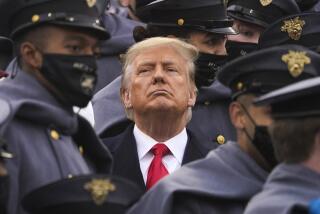Hands Off : Bush Lets Generals Make the Key Tactical Decisions
- Share via
WASHINGTON — Unlike President Lyndon B. Johnson’s micro-management of the Vietnam War, George Bush is leaving war tactics to his generals, including the decision of when to launch a ground offensive to try to expel Iraqi forces from Kuwait.
“That (the timing of a ground offensive) is all part of the overall military plan. Final judgments as to actually when to use ground forces and in what areas would be made by the military,” White House spokesman Marlin Fitzwater said today.
Fitzwater said Bush will probably be consulted before U.S. forces start what looms as the bloodiest phase of Operation Desert Storm, but he does not have to give the go-ahead.
While content to let his field commanders run the war, Bush is still spending a significant amount of time on the 6-day-old conflict at a time when he ordinarily would be busy completing his State of the Union address and the new federal budget.
Bush will lay out his agenda for the year in the annual address to Congress and the country next Tuesday and submit his proposed budget Feb. 4.
“He’ll receive phone calls from (National Security Adviser) Brent Scowcroft throughout the day. He may talk to (Defense Secretary Dick) Cheney and others throughout the day. He’ll watch some television reports,” Fitzwater said.
“Clearly he’s involved, clearly he’s concerned and being kept abreast of developments,” another White House official said when asked about Bush’s day-to-day role in prosecuting the conflict with Iraq.
Johnson, who sent U.S. forces into combat in Vietnam in the mid-1960s, was so obsessed with the war that he sometimes passed sleepless nights in the White House situation room selecting bombing targets.
Bush, who returned Monday from a three-day weekend at the presidential retreat at Camp David, Md., looking weary and suffering from a head cold, has so far avoided following LBJ’s example.
He has focused on political and diplomatic aspects of the war, trying to maintain the cohesiveness of the international alliance arrayed against Iraq with frequent telephone calls to other coalition leaders.
Bush underscored his determination to avoid getting bogged down in the minutiae of the gulf conflict when the first setback of the war occurred last week.
When Iraqi Scud missiles hit Israel last Thursday night (Friday morning Israel time), Bush did not rush back to his desk from the White House residence, where he was having dinner with Environmental Protection Agency Administrator William Reilly.
Instead, he let Scowcroft, Secretary of State James A. Baker III and other top aides deal with the immediate crisis, staying in touch with them by telephone.
When the second Iraqi attack on Israel occurred less than 24 hours later, however, Bush could no longer delegate. He was awakened at 3 a.m. and immediately made the first of two telephone calls that day to Israeli Prime Minister Yitzhak Shamir to assure Shamir of his anguish and concern.
Bush then made a strategic decision to deploy U.S. troops to Israel for the first time to man Scud-busting Patriot missiles until Israeli operators are trained.
His intervention apparently worked. Avoiding a move that could split the anti-Iraq coalition and widen the Gulf War, Israel so far has refrained from striking back at Iraq.
More to Read
Get the L.A. Times Politics newsletter
Deeply reported insights into legislation, politics and policy from Sacramento, Washington and beyond. In your inbox twice per week.
You may occasionally receive promotional content from the Los Angeles Times.










